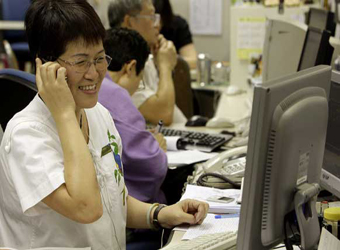Japan’s Nikkei 225 reversed early losses to trade flat after surging close to two percent on Tuesday.
Across the Korean Strait, the Kospi slipped 0.05 percent. Gains in automakers were offset by losses in tech stocks and retailers: Hyundai Motor rose 1.43 percent, Samsung Electronics shed 0.08 percent and Lotte Shopping fell 3.25 percent.
Down Under, the S&P/ASX 200 lost 0.11 percent, with the telecommunications services sub-index falling 0.91 percent. Financials were also pressured, with the sub-index edging down 0.4 percent.
Markets in greater China made moderate gains, with Hong Kong’s Hang Seng Index rising 0.29 percent. Casino stocks climbed, with Melco International Development surging 10.64 percent.
On the mainland, the Shanghai Composite advanced 0.22 percent and the Shenzhen Composite tacked on 0.502 percent.
The Fed is expected to keep interest rates steady when it announces its rates decision Wednesday U.S. time. Investors, however, awaited details on how the central bank will unwind its $4.5 trillion balance sheet. Also in focus will be the Federal Open Market Committee’s dot plot, a chart showing Fed members’ expectations about future interest rates.
Also in focus will be the Federal Open Market Committee’s dot plot, a chart showing Fed members’ expectations about future interest rates.
Market expectations for a December interest rate hike have risen in recent days, with the CME Group’s FedWatch tool reflecting a 62.7 percent probability for at least one additional rate hike by year-end.
Still, Fed Chair Janet Yellen might not be keen on signaling an additional rate hike, Kathy Lien, managing director of foreign exchange strategy at BK Asset Management, said in a note.
Lien cited softer wage growth, employment and spending since the central bank’s last policy meeting, adding that there was very little to be excited about regarding the U.S. economic outlook.
Going forward, some market watchers indicated the greenback could be tracking lower.
“With tepid inflation, the dot plot for the longer term is more vulnerable to downward revisions and this could potentially weigh down the dollar,” said Zhu Huani, market economist at Mizuho Bank, in a morning note.
The dollar extended losses after sliding against a basket of currencies overnight, with the dollar index standing at 91.741 at 11:32 a.m. HK/SIN. The U.S. currency, meanwhile, was flat against the yen at 111.50.
Elsewhere, investors took note of President Donald Trump’s United Nations address on Tuesday, although there were few resulting moves in markets. In his remarks, Trump called North Korean leader Kim Jong Un a “Rocket Man” on a “suicide mission” and said the U.S. would have to “totally destroy” the hermit state if forced.
Tensions on the Korean Peninsula had been elevated after North Korea’s sixth and most powerful nuclear test earlier this month. More recently, the North launched a missile that passed over Japan on Sept. 15 local time.
Stateside, stocks closed higher on Tuesday. The Dow Jones industrial average rose 0.18 percent, or 39.45 points, to close at a record 22,370.80.
In corporate news, Toshiba chose a consortium backed by Bain Capital as the buyer of its memory chip unit, according to Reuters. The Japanese conglomerate indicated last week it had entered into a memorandum of understanding with Bain Capital over the sale.
Toshiba’s decision came after an earlier Reuters report on Tuesday said the company was favoring a separate group backed by Western Digital. Toshiba stock traded 1.9 percent higher.
Meanwhile, the Bank of Japan will be on the radar as the central bank begins a two-day meeting. It’s set to make its interest rate decision on Thursday.
Ahead of the BOJ’s decision, the Wednesday release of Japan trade data suggested the economic outlook in the country was healthy. August exports rose 18.1 percent compared to one year ago. That was above the 14.7 percent increase forecast in a Reuters poll, the news agency reported. The August data was also above the 13.4 percent increase seen in July, Reuters said.
Japan’s trade surplus stood at 113.6 billion yen ($1.92 billion)— above the 93.9 billion yen forecast, Reuters added.
On the energy front, oil prices rose after declining slightly overnight. Brent crude rose 0.42 percent to trade at $55.37 a barrel, a touch below a five-month high of $55.99 set recently. U.S. crude advanced 0.61 percent to $49.78.
